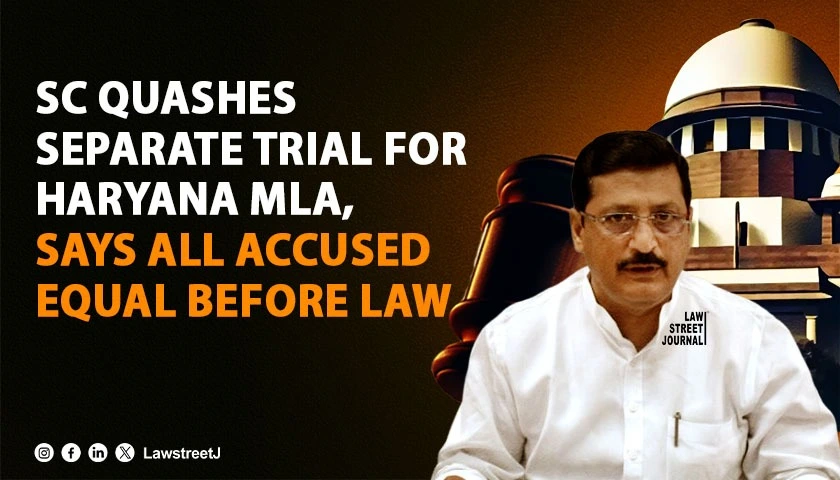New Delhi: The Supreme Court has set aside orders directing the segregation of Haryana Congress MLA Mamman Khan’s trial from that of his co-accused, ruling that political status alone cannot justify separate proceedings and emphasizing that all accused stand equal before the law.
A bench comprising Justices J.B. Pardiwala and R. Mahadevan delivered the judgment on September 12, 2025, in criminal appeals arising from the communal violence that occurred in Nuh district on July 31, 2023. The Court held that the trial court’s decision to segregate Khan’s trial solely on account of his status as a sitting MLA violated fundamental constitutional principles.
The appeals challenged the Punjab and Haryana High Court’s December 12, 2024 judgment, which had dismissed Khan’s petitions seeking to quash trial court orders dated August 28 and September 2, 2024. These orders had directed the prosecution to file separate charge sheets against Khan and segregated his trial from 43 other accused in FIR No. 149 and 28 accused in FIR No. 150, both registered at Police Station Nagina, District Nuh.
Khan, who represents the Ferozepur Jhirka constituency, was named as an accused in cases registered under various sections of the Indian Penal Code, including rioting, dacoity, mischief by fire, criminal intimidation, and conspiracy, in connection with large-scale communal violence that resulted in loss of lives and extensive property damage.
The trial court had justified the segregation by citing the repeated non-appearance of certain co-accused and the Supreme Court’s directions in Ashwini Kumar Upadhyay v. Union of India regarding the expeditious disposal of cases involving MPs and MLAs. It had ordered that Khan’s case be taken up on a day-to-day basis pursuant to those directions.
Senior counsel for Khan argued that the segregation was arbitrary and legally untenable, contending that Section 223(d) of the Code of Criminal Procedure mandates joint trials for persons accused of different offences committed in the same transaction. They emphasized that the alleged conspiracy linked Khan with the co-accused, making separate trials impermissible and potentially prejudicial.
The Supreme Court found merit in these arguments, observing that the prosecution’s case rested on an overarching conspiracy with interlinked evidence, including call detail records, electronic communications, video footage, witness statements, and forensic reports. The Court further noted that “segregation was directed not on any legally recognized ground such as distinct facts, severable evidence, or demonstrated prejudice but solely on account of the appellant’s political office.”
The Court also clarified that the Ashwini Kumar Upadhyay judgment, while emphasizing the expeditious disposal of cases involving legislators, “nowhere intends that such expedition be achieved by compromising the fundamental rights of the accused.” The bench emphasized that these directions do not authorize deviation from the mandatory legal norms governing joint trials.
Addressing the constitutional implications, the Supreme Court reiterated that Article 14 guarantees equality before the law and equal protection, stating: “All accused stand equal before the law, and preferential segregation militates against the equality principle enshrined in Article 14.” The Court stressed that no person, whether a sitting MLA or an ordinary citizen, can be subjected to procedural disadvantage without express legal justification.
The judgment highlighted serious procedural violations, noting that the segregation order had been passed suo motu without issuing notice to Khan or providing him an opportunity to be heard. The Court observed that “departure from established legal procedure, particularly without hearing the affected party, constitutes a serious constitutional infraction.”
The Court also found that the trial court had exceeded its jurisdiction by directing the police to file separate charge sheets, noting that “the discretion to file a charge sheet lies solely with the investigating agency.” Even where multiple charge sheets are filed, the Court emphasized that offences arising from the same transaction must be tried together.
Addressing concerns about judicial efficiency, the Court noted that separate trials would “necessarily involve recalling the same witnesses, resulting in duplication, delay, and the risk of inconsistent findings.” The proper course, according to the judgment, would have been to segregate absconding or defaulting accused rather than Khan, who was regularly appearing before the court.
The bench emphasized that while the right to a speedy trial is an essential facet of Article 21, “it cannot be secured at the cost of fairness.” The Court stressed that procedural fairness and statutory compliance cannot be sacrificed for administrative convenience.
Consequently, the Supreme Court set aside the impugned orders and quashed the direction for separate charge sheets and a segregated trial. The matter was remitted to the trial court with directions to conduct a joint trial of Khan along with the co-accused, while maintaining the liberty to regulate proceedings for expeditious disposal without compromising procedural safeguards.
Case Title: Mamman Khan vs. State of Haryana













